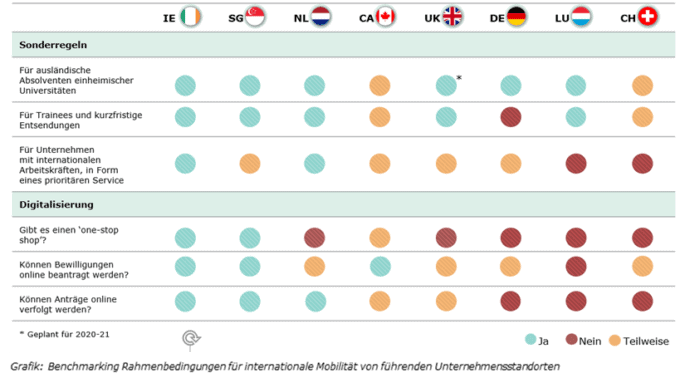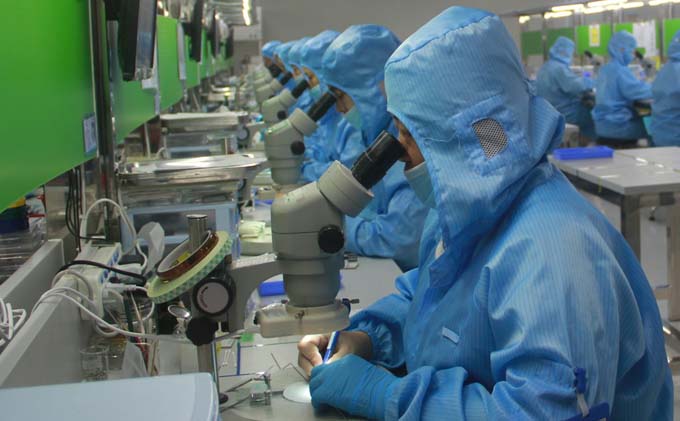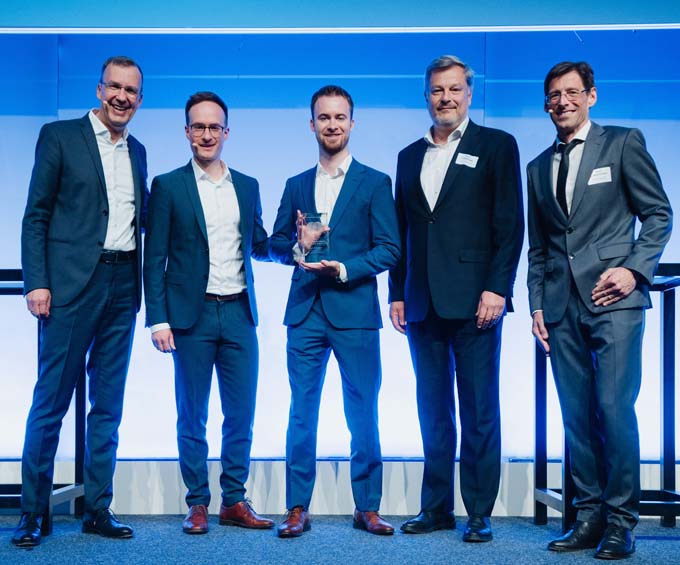International top executives: Switzerland lags behind in general conditions
Can companies attract top international talent to Switzerland that they need for sustainable growth? In a comparison of the framework conditions in eight relevant business locations, Switzerland comes in last: the approval processes are complicated and time-consuming, companies shy away from the paperwork with various offices and successful foreign university graduates leave the country in large numbers.
Although Switzerland is still one of the most attractive business locations in the world, it is steadily losing ground. At the same time, the baby boomers are leaving the workforce and the shortage of skilled workers is becoming more acute. In order to keep the business location attractive, more modern regulations are therefore needed for young, highly talented people, as well as privileged access to the authorities for certified companies. In addition, regulations must be gradually harmonised throughout Switzerland and processes digitised.
The clients of the consulting firm Deloitte, like the members of the Swiss-American Chamber of Commerce (Swiss AmCham), observe this in many areas. But complaints about hurdles standing in the way of hiring top international talent are particularly common. The two organizations teamed up to measure the impact of these people on the Swiss economy and to compare the framework conditions of leading business locations for the exchange of skilled workers. After several dozen discussions with experts from companies and associations, as well as with business leaders and politicians, we came up with various proposals for improvement.
Only four percent of all companies based in Switzerland operate internationally, but they create a quarter of all jobs, generate around a third of Switzerland's gross domestic product and pay almost half of all corporate taxes in Switzerland. This category includes not only large corporations, but also many innovative SMEs geared to the global market. With their innovative strength, all these companies make a decisive contribution to the competitive strength and prosperity of our country. And they rely to a large extent on the international mobility of workers - including those from outside the EU and EFTA.
Few people with great added value
At three percent of annual migration, international top executives from third countries are currently only a small group. However, they make an above-average contribution to the value added of Swiss companies. For example, the 3,800 people from third countries in highly productive sectors generated an average of just under CHF 240,000 in 2017, while the Swiss average was around CHF 150,000. In addition, these people often set up their own companies and thus create jobs.
"Companies in Switzerland are globally successful and therefore depend on the best workers worldwide. Highly talented international top executives make a decisive contribution to mitigating the intensifying shortage of skilled workers. And they counteract the impact of demographic aging, promote knowledge exchange, increase tax and social security revenues and boost productivity," explains Reto Savoia, CEO of Deloitte Switzerland.
Switzerland brings up the rear
A non-exhaustive comparison of six criteria at eight different internationally attractive locations conducted by Deloitte Switzerland in cooperation with the local Deloitte experts for talent mobility clearly shows: The approval processes especially for young highly talented workers and for intra-company mobility in Switzerland are too burdensome. All companies have to go through the same complex processes, no matter how often they apply for permits. Few cantons allow applications to be submitted entirely online, let alone tracked through the entire processing cycle. It is particularly difficult to obtain work permits for young, highly talented people without long work experience.

"Switzerland cannot compete with locations such as Ireland, Singapore, Germany or Luxembourg when it comes to the framework conditions for the mobility of international top executives. In our ranking of eight countries, it comes in last place. Improved framework conditions could therefore effectively increase Switzerland's competitiveness and innovative capacity and thus increase our prosperity and create jobs," explains Reto Savoia.
Swiss AmCham CEO Martin Naville adds: "Neither a fundamental change to the existing immigration system nor the abolition of quotas for workers from outside the EU and EFTA is needed. Instead, we are proposing minimally invasive adjustments that will noticeably improve Switzerland's competitiveness - and without any side effects such as wage dumping, density stress or greater competition for jobs."
Improvements for graduates
The general conditions for young, highly talented people and start-ups are to be improved by two measures: On the one hand, students from outside the EU or EFTA who have completed at least a Master's degree at a Swiss university would receive a residence permit for three years and would be able to take up a job without being subject to the priority for Swiss nationals. This measure would not only strengthen the location, but also increase the attractiveness of Swiss universities.
Secondly, graduates of master's courses in STEM subjects (mathematics, information technology, natural sciences and technology) from selected top universities worldwide would be allowed to seek employment in Switzerland. Provided they can demonstrate sufficient financial resources, they would be granted a residence permit of up to three years without already having a job offer. This solution would be particularly helpful for start-ups. They may be drivers of innovation, but they are not very adept at navigating the complex bureaucratic requirements of international mobility.
Simplify international trainee programs
The internal mobility of employees across borders is becoming more and more important, just think of international trainee programmes, internal company training, business trips to Switzerland or temporary on-site training of employees. In order to simplify internal company mobility, it is proposed to create a certification system for certain companies, which would then be able to obtain permits more easily and quickly or, if necessary, would no longer need them. Of course, these companies would have to be able to prove compliance with all regulations and would be heavily sanctioned in the event of violations.
Authorities must want digitisation
In addition, authorities at cantonal and federal level should press ahead with the extensive digitisation and gradual harmonisation of authorisation processes throughout Switzerland, without undermining cantonal autonomy and decision-making freedom. This would also make it possible to measure key performance indicators such as processing time and increase process transparency. The creation of a customer interface for direct communication between companies and cantonal authorities would be particularly visible.
"Our discussions with companies and public authorities have shown that the need for greater digitalisation is generally recognised. The path towards this can be taken without political decisions. I would therefore like to call on all stakeholders to push ahead with digitalisation for the registration of foreign workers, for example via the existing EasyGov business portal," says Martin Naville.
No departure from quotas
The new regulations would mean a moderate increase in the annual quotas for people from third countries by around 1,500: half would be longer-term residence permits, the other half short stays. Roughly calculated, this figure corresponds to around one percent of all people who come to live in Switzerland each year.
"The proposed adjustments are not a departure from the tried and tested system of quotas. Nor do they change the fact that we should not jeopardise the tried and tested system of bilateral agreements and should work continuously towards a framework agreement with the EU. The selective measures to improve the mobility of highly talented workers are very important for Switzerland as a business location. We are talking here about people who drive innovation through their activities, enrich social life and, on balance, create new jobs," explains Reto Savoia.
Realistic examples from current practice to illustrate the concrete fields of action:
- Non-EU/EFTA graduates from universities in Switzerland: After completing her doctorate in applied mathematics at ETH Zurich, an Argentinean woman receives an interesting offer from a start-up in eastern Switzerland. However, the start-up is put off by the complexity, costs and unpredictability of the approval process and withdraws the offer. However, the young woman subsequently accepts a job offer in London and leaves Switzerland again after completing her training.
- Non-EU/ EFTA graduates in STEM from top foreign universities: An Indian computer science graduate from Oxford works temporarily in Switzerland and receives an offer from another employer with a permanent contract. The employer is hesitant because of the complex approval process, not least in view of the uncertain prospects of success. While the employer is still considering whether to invest resources, the man receives a job offer from the USA and leaves Switzerland.
- Business Travel: The employees of an international company with headquarters in Basel regularly travel from abroad, usually for less than 20 days per employee per year. Today, the company applies for 120-day permits for the business travellers in order to be on the safe side. This causes considerable additional work for the company and the authorities.
- Top talent traineeship: A large Swiss company wants to open a training centre for international junior staff at its headquarters in Biel. However, the Swiss approval process for the junior staff proves to be too time-consuming. The company therefore opens the training centre in Ireland.









